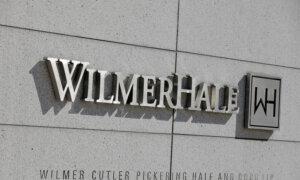While one has negotiated a deal with the White House, three other firms have filed lawsuits in federal court.
President Donald Trump has issued executive orders against several prominent law firms, suspending employees’ security clearances and reviewing federal contracts with the firms.
Trump has issued four executive orders and one memo citing “significant risks associated with law firms, particularly so-called ‘Big Law’ firms, that engage in conduct detrimental to critical American interests,” according to the administration’s March 25 order targeting Jenner & Block LLP. The administration says that such firms engage in “conduct detrimental to critical American interests.”
To date, executive actions have been taken against five firms, including Paul, Weiss, Rifkind, Wharton & Garrison; Wilmer Cutler Pickering Hale and Dorr (WilmerHale); Jenner & Block; Perkins Coie; and Covington & Burling.
The orders call on department heads to suspend security clearances with the firms still under review, and in some cases, suspend or end contracts with the firms, along with other methods of cutting the flow of taxpayer dollars to the firms in question.
According to the administration, these firms take actions that could risk public safety and national security, launch cases that limit constitutional freedoms, and undermine American principles, among other concerns.
In several instances, the attorneys at the firms are or were involved in some of the litigation that has followed the president since his first term in office.
Actions Against Multiple Firms
The White House actions against Covington & Burling, Perkins Coie, Jenner & Block, and WilmerHale were similar in that in each instance, security clearances were revoked or suspended, pending review.
Additionally, in each of the executive orders, the president ordered that heads of agencies ensure that taxpayer dollars are not flowing to any business or contractor, including the firms, that engage in activities that don’t align with the administration’s values.
The orders all specifically noted concern that the contractors were engaged in “racial discrimination,” with each order alleging race-based influence in personnel hiring or advancement.
With regard to Perkins Coie, the presidential order said, “Those who engage in blatant race-based and sex-based discrimination, including quotas, but purposefully hide the nature of such discrimination through deceiving language, have engaged in a serious violation of the public trust.”
Also cited was the firm’s involvement in cases that allegedly included falsified documents and “anti-democratic election changes.”
Paul, Weiss, Rifkind, Wharton & Garrison LLP
In a March 14 executive order targeting Paul, Weiss, Rifkind, Wharton & Garrison, known as Paul Weiss, Trump called for the attorney general and the director of national intelligence to suspend active security clearances held by those at or associated with the firm, pending a review.
The president stated that in addition to general concerns about law firms working with the federal government, a firm partner and former leading prosecutor in the office of special counsel Robert Mueller brought a pro bono suit against some of those allegedly involved in the breach of the U.S. Capitol on Jan. 6, 2021.
“Paul Weiss hired unethical attorney Mark Pomerantz, who had previously left Paul Weiss to join the Manhattan District Attorney’s office solely to manufacture a prosecution against me and who, according to his co-workers, unethically led witnesses in ways designed to implicate me,” Trump said.
In addition, the order alleged that the firm has violated civil rights law, stating that “Paul Weiss, along with nearly every other large, influential, or industry-leading law firm, makes decisions around ‘targets’ based on race and sex.”
Just a week later, the firm cut a deal with the White House. Trump issued another executive order on March 21, rolling back the restrictions, stating that Paul Weiss “indicated that it will engage in a remarkable change of course.”
According to that executive order, the firm “acknowledged the wrongdoing of its former partner” and agreed to policy changes, consistent with the administration’s recent orders surrounding diversity, equity, and inclusion, or DEI, and other hiring and promotion practices.
The firm also dedicated the equivalent of $40 million for pro bono legal services to support veterans, combat anti-Semitism, and other initiatives.
Pushback
Other firms haven’t taken the same tact. Three of them have sued the Trump administration.
Perkins Coie filed suit on March 11, persuading a judge to temporarily block enforcement of the order.
Jenner & Block and WilmerHale both have filed suits in federal court, saying that the orders are unconstitutional, an assault on the legal system, and a form of presidential retaliation.
On March 28, two judges blocked parts of the orders against Jenner & Block and WilmerHale.
U.S. District Judge John Bates ruled on the order against Jenner & Block, specifically the portion that barred the attorneys from entering federal courthouses and federal buildings.
“Considering the firm-wide effects of the executive order, it threatens the existence of the firm,” he said.
U.S. District Judge Richard Leon issued a ruling on the WilmerHale case, calling Trump’s order retaliatory and granting the firm’s request to block parts of the action, including the restriction of access to government buildings and offices.
However, the judge denied the firm’s request to halt the section that suspended security clearances held by the firm’s attorneys.
A New Deal
Also, on March 28, the Trump administration announced that a deal was struck with prominent Wall Street law firm Skadden, Arps, Slate, Meagher & Flom LLP. The firm has promised to dedicate $100 million in pro bono legal services to assist veterans and other public servants and to work on issues such as fairness in the justice system and combating anti-Semitism.
Additionally, the firm promised to fund at least five law school graduates under a fellowship dedicated to supporting the causes every year and engaging in merit-based hiring practices.
“This was essentially a settlement,” Trump said in announcing the deal at a White House event. “We appreciate Skadden’s coming to the table. As you know, other law firms have likewise settled the case. And … what’s gone on is a shame.”
The Epoch Times has reached out to the law firms in question about the orders.
The Associated Press contributed to this report.











